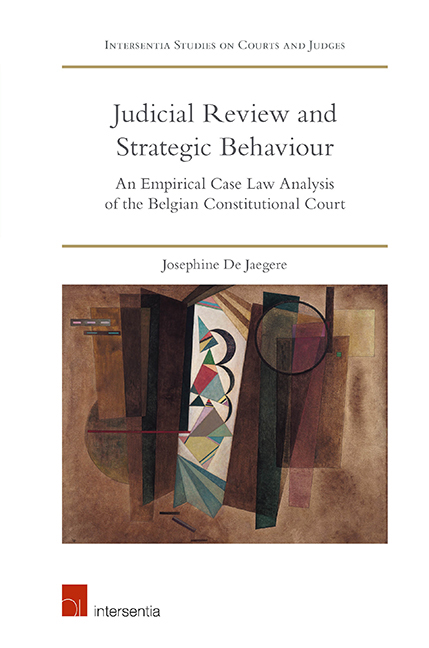 Judicial Review and Strategic Behaviour
Judicial Review and Strategic Behaviour Book contents
- Frontmatter
- Foreword
- Acknowledgements
- Contents
- Introduction
- PART I NORMATIVE FRAMEWORK: THE DELIBERATIVE PERFORMANCE OF CONSTITUTIONAL COURTS
- Chapter 1 Constitutional Review in Democratic Systems: Countering the Counter-Majoritarian Objection
- PART II THE CONTOURS OF JUDICIAL DECISION-MAKING
- PART III EMPIRICAL ANALYSIS OF THE BELGIAN CONSTITUTIONAL COURT'S CASE LAW
- Conclusion
- Codebook
- Bibliography
- Index
- About The Author
Chapter 1 - Constitutional Review in Democratic Systems: Countering the Counter-Majoritarian Objection
from PART I - NORMATIVE FRAMEWORK: THE DELIBERATIVE PERFORMANCE OF CONSTITUTIONAL COURTS
Published online by Cambridge University Press: 26 June 2019
- Frontmatter
- Foreword
- Acknowledgements
- Contents
- Introduction
- PART I NORMATIVE FRAMEWORK: THE DELIBERATIVE PERFORMANCE OF CONSTITUTIONAL COURTS
- Chapter 1 Constitutional Review in Democratic Systems: Countering the Counter-Majoritarian Objection
- PART II THE CONTOURS OF JUDICIAL DECISION-MAKING
- PART III EMPIRICAL ANALYSIS OF THE BELGIAN CONSTITUTIONAL COURT'S CASE LAW
- Conclusion
- Codebook
- Bibliography
- Index
- About The Author
Summary
This first chapter explores the role of constitutional courts in democratic systems. Building on deliberative theory, a normative framework is built against which the BeCC's performance can be evaluated. This framework is defined by the key concepts of inclusiveness, rationality, transparency and dialogue. Without arguing that this framework may be applicable to any court in any period, the aim is to provide a ‘middle-level’ normative theory which sets out prescriptions and guidelines to be followed. In particular, several judicial ‘good practices’ are highlighted and discussed. These will be further explored in the case law analysis in the fourth part of this book.
In sum, it is argued that a strong deliberative performance can enhance the quality and legitimacy of democratic policy-making. Because of constitutional courts ‘ potential to remedy malfunctions in the representative system, judicial review provides a post hoc alternative path to enhance the deliberative component of policy-making. The purpose is not to insinuate the superiority of constitutional courts in relation to the legislative branch, but to justify their place in an overall system of democratic decision-making. In that sense, deliberative theory helps to overcome the counter-majoritarian objections against constitutional review.
DEMOCRATIC POLICY-MAKING: AN ELECTORAL AND A DELIBERATIVE COMPONENT
Although many democratic countries have established some type of constitutional review, scholars still raise the counter-majoritarian objection. Their argument derives from the idea that one of the most fundamental characteristics of a democracy is the equal opportunity for citizens, by means of elections, to participate in policy choices. Even though some might disagree with the outcome of the legislative procedure, it is argued that each expressed opinion was given the greatest weight possible compatible with giving equal weight to all opinions. Hence legislation is legitimate when approved by a majority of the elected representatives. According to the opponents of judicial review, courts lack the democratic legitimacy to reject or overrule this legislation. They argue that such review conflicts with the essential principles of representation and political equality. In addition, as discussed at greater length in chapter 5, invalidations by a constitutional court are even more delicate when the invalidated legislation was the product of broad and encompassing supermajorities, as is often the case in consociational democracies like Belgium.
- Type
- Chapter
- Information
- Judicial Review and Strategic BehaviourAn Empirical Case Law Analysis of the Belgian Constitutional Court, pp. 13 - 58Publisher: IntersentiaPrint publication year: 2019
